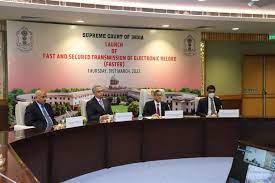news details |
|
|
| CJI Ramana launches 'FASTER' software for transmitting judicial orders | | |  agencies agencies
NEW DELHI, Mar 31: Chief Justice of India NV Ramana on Thursday launched 'Fast and Secured Transmission of Electronic Records' (FASTER) software to transmit court orders swiftly and securely through electronic mode, ensuring quicker communication of judicial orders.
"Orders passed by the Supreme Court and high courts have to be transmitted safely without interference by third parties. We have nominated 73 nodal officers at the HC level and jail authorities selected through a judicial communication network. A secure pathway email id has been established," the CBI said at an online function.
Besides the CJI, Justices AM Khanwilkar, DY Chandrachud and Hemant Gupta and chief justices and judges of various high courts also attended the online function to launch the software.
"There are a total of 1,887 email ids of these nodal officers connected across the country. FASTER will communicate bail orders and for the purpose of authentication it will have digital signatures of SC officers. Communication is restricted to the email id holders, which ensures confidentiality, safety and security," the CJI said.
A Bench led by CJI Ramana had earlier taken suo motu cognizance of delay in the release of convicts even after granting of bail on grounds such as non-receipt or non-verification of judicial orders.
CJI Ramana hoped that in the near future as part of the second phase of the project, the Supreme Court will be able to transmit all the records through this system dispensing altogether with the need to share hard copies.
A total of 1887 e-mail IDs were created for this system across the country. The FASTER Cell has been established in the Registry of the Supreme Court. It will transmit Record of Proceedings or Orders related to bail and release passed by this Court to the concerned Nodal Officers and duty holders through e-mail.
For the purposes of authentication, all such Orders or Record of Proceedings would bear digital signatures of authorised Nodal Officers of the Supreme Court as well as Institutional digital signatures. In this way, without loss of much time, such orders would be received by all concerned for necessary action at their end. |
|
|
|
|
|
|
|
|
|
|
|
|
| |
| |
|
|
|
|
 |
|
|
|
|
STOCK UPDATE |
|
|
 |
| BSE
Sensex |
 |
| NSE
Nifty |
|
|
| |
CRICKET UPDATE |
|
|
|
|
|
| |
| |
|
|
| |
|
|
|
|
| |
|
|
|
|
|
|
|
|
|
|
|
|
|
